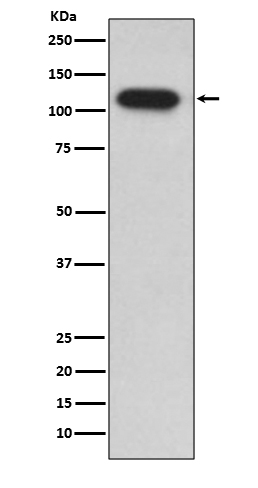
| WB | 1/500-1/1000 | Human,Mouse,Rat |
| IF | 咨询技术 | Human,Mouse,Rat |
| IHC | 1/50-1/100 | Human,Mouse,Rat |
| ICC | 技术咨询 | Human,Mouse,Rat |
| FCM | 咨询技术 | Human,Mouse,Rat |
| Elisa | 咨询技术 | Human,Mouse,Rat |
| Aliases | INSULYSIN; Insulin degrading enzyme; IDE |
| Entrez GeneID | 3416 |
| WB Predicted band size | Calculated MW: 118 kDa; Observed MW: 118 kDa |
| Host/Isotype | Rabbit IgG |
| Antibody Type | Primary antibody |
| Storage | Store at 4°C short term. Aliquot and store at -20°C long term. Avoid freeze/thaw cycles. |
| Species Reactivity | Human,Mouse,Rat |
| Immunogen | A synthesized peptide derived from human IDE |
| Formulation | Purified antibody in PBS with 0.05% sodium azide. |
+ +
以下是关于 **Insulin Degrading Enzyme (IDE) 抗体**的3篇参考文献及其简要摘要:
1. **文献名称**: *“Insulin-degrading enzyme regulates the levels of insulin, amyloid β-protein, and the β-amyloid precursor protein intracellular domain in vivo”*
**作者**: Farris W, Mansourian S, Chang Y, et al.
**摘要**: 该研究通过免疫组织化学和Western blot技术,利用特异性IDE抗体证实了IDE在小鼠脑组织中对胰岛素和β淀粉样蛋白(Aβ)的降解作用,并揭示了其在阿尔茨海默病模型中的病理调控机制。
2. **文献名称**: *“Deficiency of insulin-degrading enzyme leads to accumulation of neurotoxic peptides in vivo”*
**作者**: Miller BC, Eckman EA, Sambamurti K, et al.
**摘要**: 研究通过IDE基因敲除小鼠模型,结合抗IDE抗体检测,发现IDE缺失会导致胰岛素和Aβ的异常积累,并引发神经元功能损伤,强调了IDE在代谢和神经退行性疾病中的关键作用。
3. **文献名称**: *“A cell-based assay for measuring the activity of insulin-degrading enzyme”*
**作者**: Leissring MA, Selkoe DJ.
**摘要**: 开发了一种基于细胞的新型IDE活性检测方法,通过IDE抗体定量分析酶的表达水平与底物降解效率,为筛选IDE抑制剂或激活剂提供了可靠工具。
4. **文献名称**: *“Selective targeting of extracellular insulin-degrading enzyme by monoclonal antibodies”*
**作者**: Abdul-Hay SO, Kang D, McBride M, et al.
**摘要**: 研究报道了一种靶向IDE细胞外结构域的单克隆抗体的开发,该抗体可特异性抑制IDE的酶活性,为研究IDE在糖尿病和阿尔茨海默病中的功能提供了新工具。
这些文献涵盖了IDE抗体的应用场景(如活性检测、疾病模型研究)以及其在机制探索和药物开发中的重要性。
**Background of Insulin Degrading Enzyme (IDE) Antibody**
Insulin Degrading Enzyme (IDE) is a zinc-metalloprotease primarily known for its role in regulating insulin and amyloid-β peptide (Aβ) degradation, linking it to metabolic and neurodegenerative disorders like diabetes and Alzheimer’s disease. IDE antibodies are critical tools for studying its expression, localization, and function in physiological and pathological contexts. These antibodies are designed to target specific epitopes of IDE, enabling detection in techniques such as Western blotting, immunohistochemistry, and immunoprecipitation.
IDE consists of two major structural domains (N- and C-terminal) that undergo conformational changes during substrate binding. Its substrates include insulin, glucagon, and Aβ, highlighting its dual role in glucose homeostasis and amyloid clearance. Dysregulation of IDE activity is associated with insulin resistance and Aβ accumulation, making it a therapeutic target. IDE antibodies help researchers investigate its tissue distribution (e.g., liver, brain, muscle), subcellular localization (cytosol, mitochondria), and interactions with substrates or inhibitors.
Monoclonal and polyclonal IDE antibodies are generated using recombinant proteins or peptide fragments, validated for specificity across species (human, mouse, rat). They are essential in elucidating IDE's role in disease models, such as diabetic mice or Alzheimer’s transgenic animals, and in screening potential IDE-targeted drugs. By enabling precise detection and functional studies, IDE antibodies contribute to advancing our understanding of metabolic and neurodegenerative pathways.
×